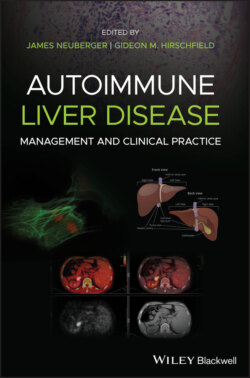Читать книгу Autoimmune Liver Disease - Группа авторов - Страница 67
Loss of Immune Tolerance to Autoantigens and Perpetuation of Autoimmune Diseases Overview
ОглавлениеAutoimmune diseases are uncommon, despite the high frequency of genetic susceptibility and environmental exposure to microbial pathogens and xenobiotics, including drugs. Autoimmunity requires four essentials. First, environmental triggers are required to initiate loss of tolerance to autoantigens in susceptible individuals (Figure 2.1). Second, the individual must have HLA alleles that facilitate autoantigen activation of T cells. Third, T cells must express autoreactive TCRs. Fourth, the individual must fail to immunoregulate the response to autoantigens. Evidence that low levels of autoimmune reactions are common in healthy people highlights the fact that these initial steps are common but only deleterious when not immunoregulated. GWAS indicates that failure to immunoregulate an autoimmune reaction is dictated by epigenetic SNPs for enhancers and SEs of gene expression more than SNPs for HLA and non‐HLA proteins. Moreover, these SNPs are critical drivers of the cell and tissue specificity of autoimmune diseases. Multiple factors and mechanisms to break tolerance to self‐antigens have been identified.
The increasing incidence of autoimmunity and inflammatory diseases observed worldwide is correlated with changes in environmental factors, including a more modern lifestyle, improved hygiene, a Western diet, use of antibiotics, and elimination of childhood parasitic infections. Each of these affect the composition and function of the gut microbiota. Although the proposed causal link between the gut microbiome and autoimmunity has not been proved, available data indicate that interplay between the gut microbiota and the innate and adaptive immune systems of the intestine and liver plays key roles in both normal and dysfunctional systemic immunity.
